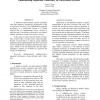Free Online Productivity Tools
i2Speak
i2Symbol
i2OCR
iTex2Img
iWeb2Print
iWeb2Shot
i2Type
iPdf2Split
iPdf2Merge
i2Bopomofo
i2Arabic
i2Style
i2Image
i2PDF
iLatex2Rtf
Sci2ools
118
click to vote
ICPP
1990
IEEE
1990
IEEE
Implementing Sequential Consistency in Cache-Based Systems
A model for shared-memory systems commonly (and often implicitly) assumed by programmers is that of sequential consistency. For implementing sequential consistency in a cache-based system, it is widely believed that (1) implementing strong ordering is sufficient and (2) restricting a processor to one sharedmemory reference at a time is practically necessary. In this paper we show that both beliefs are false. First, we prove that (1) is false with a counter-example. Second, we argue that (2) is false by giving sufficient conditions and an implementation that allow a processor to have simultaneous incomplete shared-memory references. While we do not demonstrate that this implementation is superior, we do believe it is practical and worthy of consideration.
Distributed And Parallel Computing | ICPP 1990 | Sequential Consistency | Shared-memory Systems | Simultaneous Incomplete Shared-memory |
Related Content
| Added | 11 Aug 2010 |
| Updated | 11 Aug 2010 |
| Type | Conference |
| Year | 1990 |
| Where | ICPP |
| Authors | Sarita V. Adve, Mark D. Hill |
Comments (0)

